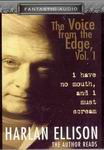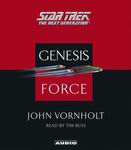
 The Voice from the Edge Vol 1: I Have No Mouth and I Must Scream
The Voice from the Edge Vol 1: I Have No Mouth and I Must Scream
By Harlan Ellison; Read by Harlan Ellison
5 CD’s – 6 hours [UNABRIDGED]
Publisher: Fantastic Audio
Published: 2002
Themes: / Science Fiction / Fantasy / Short Stories / Artificial Intelligence / Time / Demons /
This is a collection of Harlan Ellison’s best (well… most popular) stories. The most oft-reprinted tales are here, among them: “I Have No Mouth and I Must Scream”, “‘Repent, Harlequin,’ Said the Ticktockman”, “Paladin of the Lost Hour”, and “A Boy and His Dog”. The stories are read by the author, who himself is a first-rate reader, lending an infectious energy to every story in the collection.
I personally know of no other author’s stories with which to compare Harlan Ellison’s. He’s arguably the finest writer of short fiction on the planet, building stories of great impact in such a short space. In “‘Repent, Harlequin'”, he gives us a parable of society’s dependence on the clock, making schedules look ridiculous enough to make one wonder what the heck we’re all doing. And this was written in the 1960’s! In “Paladin of the Lost Hour”, a man is given responsibility over the world’s last hour. The characters in “I Have No Mouth and I Must Scream” are trapped by a malevolent computer. These are great stories, every one. I thoroughly enjoyed this collection.
Stories included in the collection: “I Have No Mouth and I Must Scream”, “Laugh Track”, “Grail”, “‘Repent, Harlequin,’ Said the Ticktockman”, The Very Last Day of a Good Woman”, “Paladin of the Lost Hour”, “The Time of the Eye”, “The Lingering Scent of Woodsmoke”, and “A Boy and His Dog”.


 The Andromeda Strain
The Andromeda Strain Star Trek: The Next Generation: Genesis Force
Star Trek: The Next Generation: Genesis Force
 The Voice from the Edge Vol 1: I Have No Mouth and I Must Scream
The Voice from the Edge Vol 1: I Have No Mouth and I Must Scream